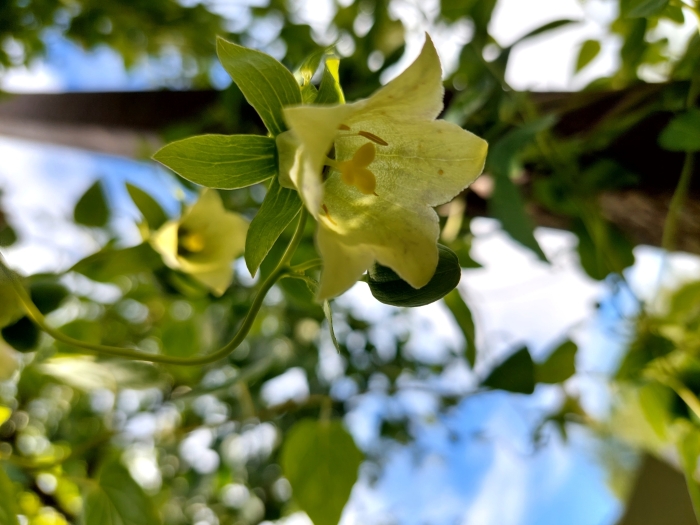Dangshen
(Codonopsis pilosula)
Dangshen (Codonopsis pilosula)
/
/

© J V
CC BY 4.0
Image By:
© J V
Recorded By:
Copyright:
CC BY 4.0
Copyright Notice:
Photo by: © J V | License Type: CC BY 4.0 | License URL: http://creativecommons.org/licenses/by/4.0/ | Uploader: j_v | Publisher: iNaturalist |


















Estimated Native Range
Summary
Codonopsis pilosula, commonly known as Dangshen, is a perennial herb that is native to a variety of habitats in Asia, including forest margins, meadows, and scrublands, particularly in China and Korea. It typically grows to a length of 7 feet (2.1 meters) with twining stems that allow it to climb. The leaves are ovate and the plant produces bell-shaped, yellow-green flowers with distinctive purple spots inside, which bloom from July to August. The flowers are modest in size but can be quite showy due to their unique coloration.
Dangshen is highly regarded for its medicinal roots, which resemble ginseng and are used in traditional Chinese medicine to enhance stamina and treat a range of conditions including those affecting the cardiovascular, pulmonary, and digestive systems. In cultivation, it is often grown under partial shade to mimic its natural forest habitat and prefers moist, well-drained soils. While it is not commonly found in ornamental gardens, it can be an intriguing addition to herb gardens or used in naturalistic plantings. Gardeners should be aware that it requires support to grow effectively and can be susceptible to slugs and snails. It is not known to be invasive and does not typically present significant problems in cultivation.CC BY-SA 4.0
Dangshen is highly regarded for its medicinal roots, which resemble ginseng and are used in traditional Chinese medicine to enhance stamina and treat a range of conditions including those affecting the cardiovascular, pulmonary, and digestive systems. In cultivation, it is often grown under partial shade to mimic its natural forest habitat and prefers moist, well-drained soils. While it is not commonly found in ornamental gardens, it can be an intriguing addition to herb gardens or used in naturalistic plantings. Gardeners should be aware that it requires support to grow effectively and can be susceptible to slugs and snails. It is not known to be invasive and does not typically present significant problems in cultivation.CC BY-SA 4.0
Plant Description
- Plant Type: Vine, Herb
- Height: 1-5 feet
- Width: 1-3 feet
- Growth Rate: Moderate
- Flower Color: Cream, Green
- Flowering Season: Summer
- Leaf Retention: Deciduous
Growth Requirements
- Sun: Full Sun, Part Shade
- Water: Medium
- Drainage: Medium
Common Uses
Bee Garden, Edible*Disclaimer: Easyscape's listed plant edibility is for informational use. Always verify the safety and proper identification of any plant before consumption., Low Maintenance, Showy Flowers
Natural Habitat
Native to forest margins, meadows, and scrublands in Asia, particularly in China and Korea
Other Names
Common Names: Dang Shen, Bonnet Bellflower, Mansam, Poor Man’s Ginseng
Scientific Names: , Codonopsis pilosula, Campanumoea pilosula, Codonopsis pilosula var. pilosula,
GBIF Accepted Name: